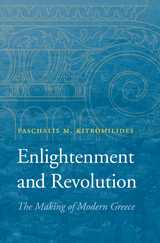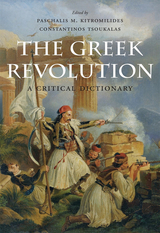
Greece sits at the center of a geopolitical storm that threatens the stability of the European Union. To comprehend how this small country precipitated such an outsized crisis, it is necessary to understand how Greece developed into a nation in the first place, Paschalis Kitromilides contends. Enlightenment and Revolution identifies the intellectual trends and ideological traditions that shaped a religiously defined community of Greek-speaking people into a modern nation-state--albeit one in which antiliberal forces have exacted a high price.
Kitromilides takes in the vast sweep of the Greek Enlightenment in the eighteenth and nineteenth centuries, assessing key developments such as the translation of Voltaire, Locke, and other modern authors into Greek; the conflicts sparked by the Newtonian scientific revolution; the rediscovery of the civilization of classical Greece; and the emergence of a powerful countermovement. He highlights Greek thinkers such as Voulgaris and Korais, showing how these figures influenced and converged with currents of the Enlightenment in the rest of Europe.
In reconstructing this history, Kitromilides demonstrates how the confrontation between Enlightenment ideas and Church-sanctioned ideologies shaped the culture of present-day Greece. When the Greek nation-state emerged from a decade-long revolutionary struggle against the Ottoman Empire in the early nineteenth century, the Enlightenment dream of a free Greek polity was soon overshadowed by a romanticized nationalist and authoritarian vision. The failure to create a modern liberal state at that decisive historic moment, Kitromilides insists, is at the root of Greece's recent troubles.

Winner of the 2022 London Hellenic Prize
On the bicentennial of the Greek Revolution, an essential guide to the momentous war for independence of the Greeks from the Ottoman Empire.
The Greek war for independence (1821–1830) often goes missing from discussion of the Age of Revolutions. Yet the rebellion against Ottoman rule was enormously influential in its time, and its resonances are felt across modern history. The Greeks inspired others to throw off the oppression that developed in the backlash to the French Revolution. And Europeans in general were hardly blind to the sight of Christian subjects toppling Muslim rulers. In this collection of essays, Paschalis Kitromilides and Constantinos Tsoukalas bring together scholars writing on the many facets of the Greek Revolution and placing it squarely within the revolutionary age.
An impressive roster of contributors traces the revolution as it unfolded and analyzes its regional and transnational repercussions, including the Romanian and Serbian revolts that spread the spirit of the Greek uprising through the Balkans. The essays also elucidate religious and cultural dimensions of Greek nationalism, including the power of the Orthodox church. One essay looks at the triumph of the idea of a Greek “homeland,” which bound the Greek diaspora—and its financial contributions—to the revolutionary cause. Another essay examines the Ottoman response, involving a series of reforms to the imperial military and allegiance system. Noted scholars cover major figures of the revolution; events as they were interpreted in the press, art, literature, and music; and the impact of intellectual movements such as philhellenism and the Enlightenment.
Authoritative and accessible, The Greek Revolution confirms the profound political significance and long-lasting cultural legacies of a pivotal event in world history.
READERS
Browse our collection.
PUBLISHERS
See BiblioVault's publisher services.
STUDENT SERVICES
Files for college accessibility offices.
UChicago Accessibility Resources
home | accessibility | search | about | contact us
BiblioVault ® 2001 - 2025
The University of Chicago Press









